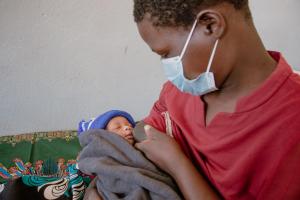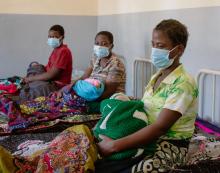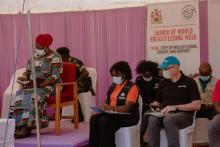Malawi marks World Breastfeed Week with commitment to step up breastfeeding
1 August 2022, Lilongwe- In solidarity for the World Breastfeeding Week, Malawi through the Ministry of Health, held a special event to launch a campaign to raise awareness about the importance of breastfeeding and its need in the lives of babies and mothers. The launch of the campaign, which will run from 1 to 7 August 2022 took place in a rural community of Chimutu in Lilongwe. Participants at the launch included the Minister of Health, Honorable Khumbize Kandodo Chiponda, government officials, the World Health Organization (WHO) Representative to Malawi, Dr Neema Rusibamayila Kimambo, UNICEF Malawi Representative, Rudolf Schwenk and other partners.
WHO recommends that children initiate breastfeeding within the first hour of birth and be exclusively breastfed for the first 6 months of life – meaning no other foods or liquids are provided, including water. However, according to Multiple Indicator Cluster Survey (MICS 2019-2020), only 6 of 10 infants are breastfeed within the first hour of life in Malawi, leaving them more vulnerable to disease and death.
Addressing the participants at the launch, the Minister of Heath, Honorable Khumbize Kandodo Chiponda said even though the performance of exclusive breastfeeding in Malawi is above the targeted 50 percent, it is important for government and partners to continue to support and protect breastfeeding.
“We are still facing challenges in initiating breastfeeding soon after delivery in some hospitals. We still have inadequate support for our working lactating mothers. For Malawi to accelerate and maintain a good score in optimal breastfeeding, we need greater investment in breastfeeding support policies and programmes.”
WHO Representative to Malawi, Dr Neema Rusibamayila Kimambo, said “WHO is committed to supporting countries with implementation and monitoring of the ‘Comprehensive implementation plan on maternal, infant and young child nutrition’, endorsed by Member States in May 2012. WHO is currently supporting Malawi in training health workers to provide skilled support to breastfeeding mothers, help them overcome problems, and monitor the growth of children.”
UNICEF Malawi Representative Rudolf Schwenk revealed that performance of breastfeeding indicators is signaling a regression in infants that are breastfeed within first hour of life; from 8 out 10 in 2016 (MDHS 2015/6) to 6 out 10 infants (MICS 2019/2020). Likewise, exclusive breast feeding among children under 6 months dropped from 72 percent in 2010 to 64 percent according to the MICS 2019/2020.
“Breastfeeding must be considered as a child development priority that requires investment at all levels. The rise in exclusive breastfeeding rates has been a success because of joint efforts from various stakeholders supporting this agenda at national, community and health facility levels. Our interventions should therefore continue being strengthened at all levels.” Said UNICEF Malawi Representative Rudolf Schwenk.
Joint statement by UNICEF Executive Director Catherine Russell and WHO Director-General Dr Tedros Adhanom Ghebreyesus on World Breastfeeding Week 2022 is calling on governments, donors, civil society and the private sector to step up efforts to:
- prioritize investing in breastfeeding support policies and programmes, especially in fragile and food insecure contexts;
- equip health and nutrition workers in facilities and communities with the skills they need to provide quality counselling and practical support to mothers to successfully breastfeed;
- protect caregivers and health-care workers from the unethical marketing influence of the formula industry by fully adopting and implementing the International Code of Marketing of Breast-Milk Substitutes, including in humanitarian settings; and
- implement family-friendly policies that provide mothers with the time, space and support they need to breastfeed.
This World Breastfeeding Week, under its theme Step up for breastfeeding: Educate and Support, UNICEF and WHO are calling on governments to allocate increased resources to protect, promote and support breastfeeding policies and programmes, especially for the most vulnerable families living in emergency settings.


